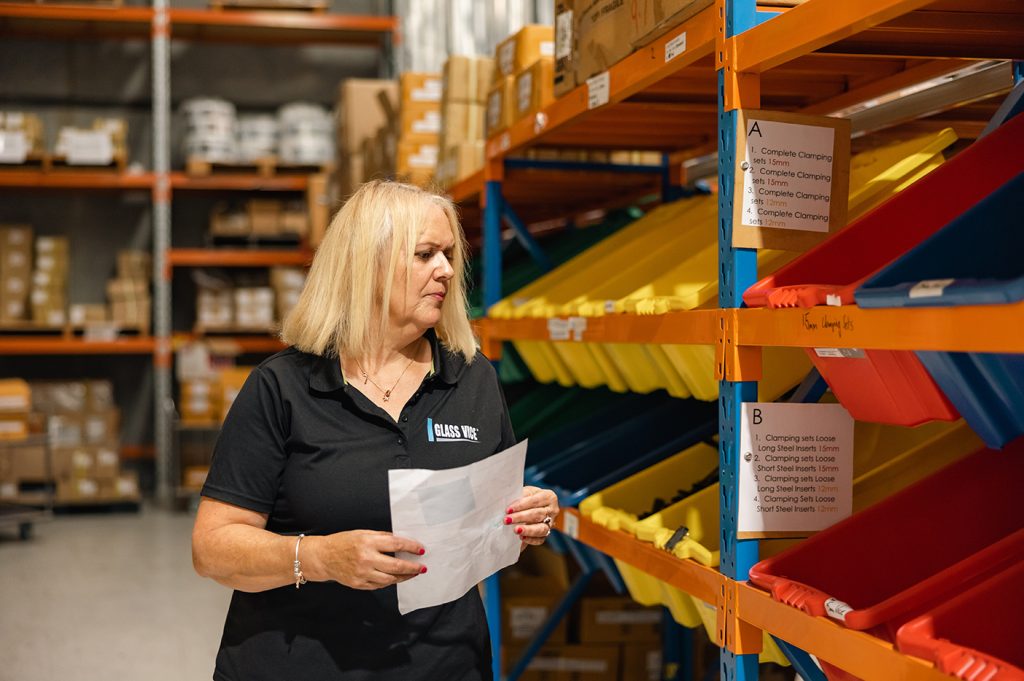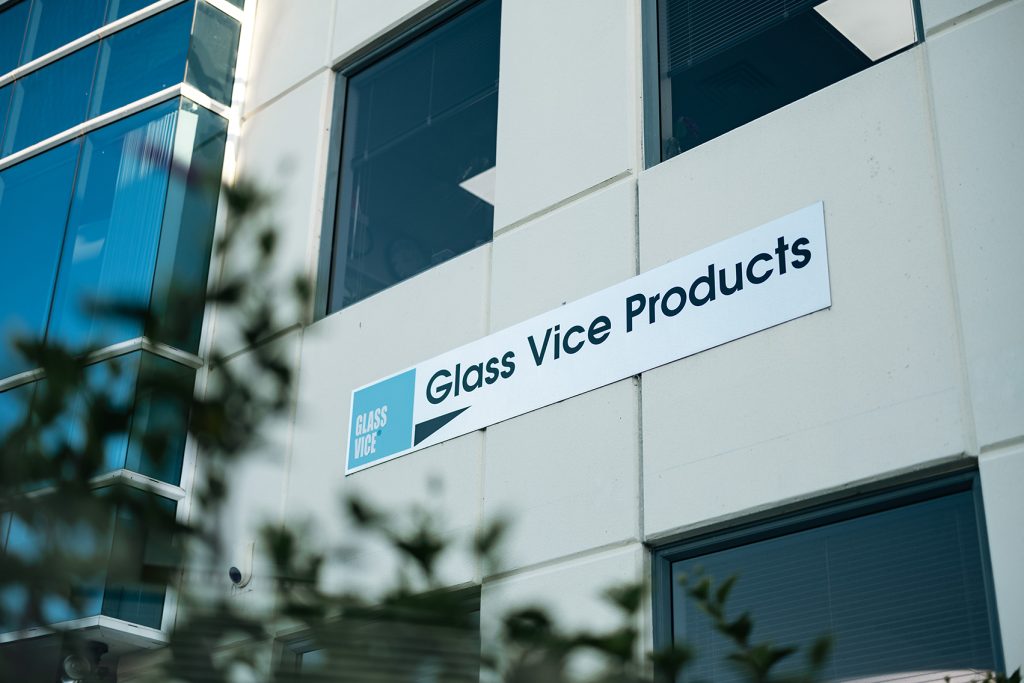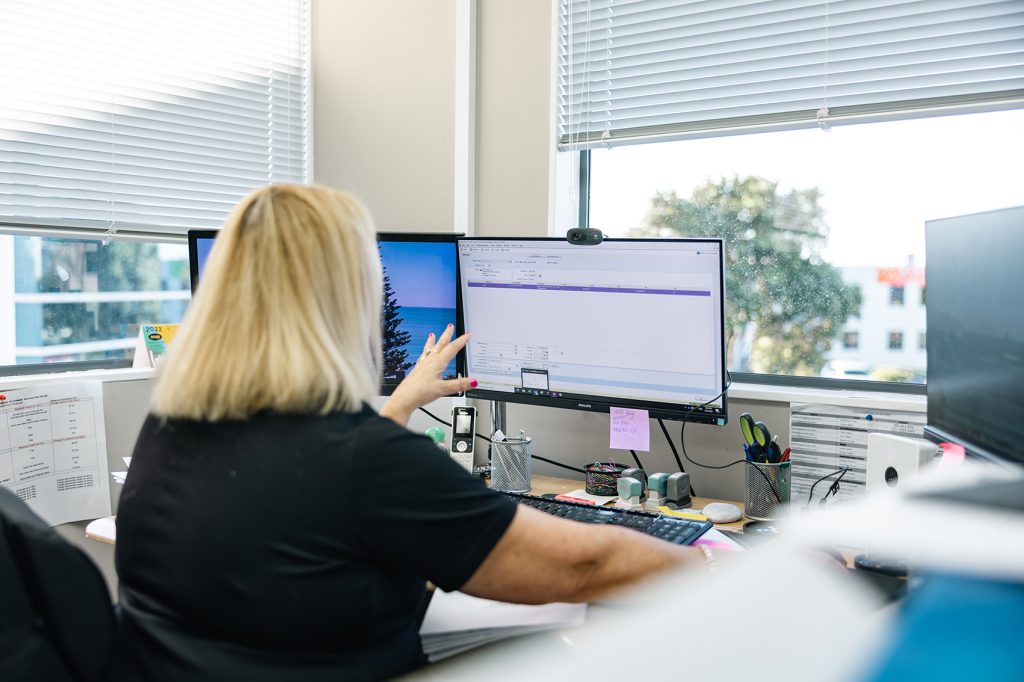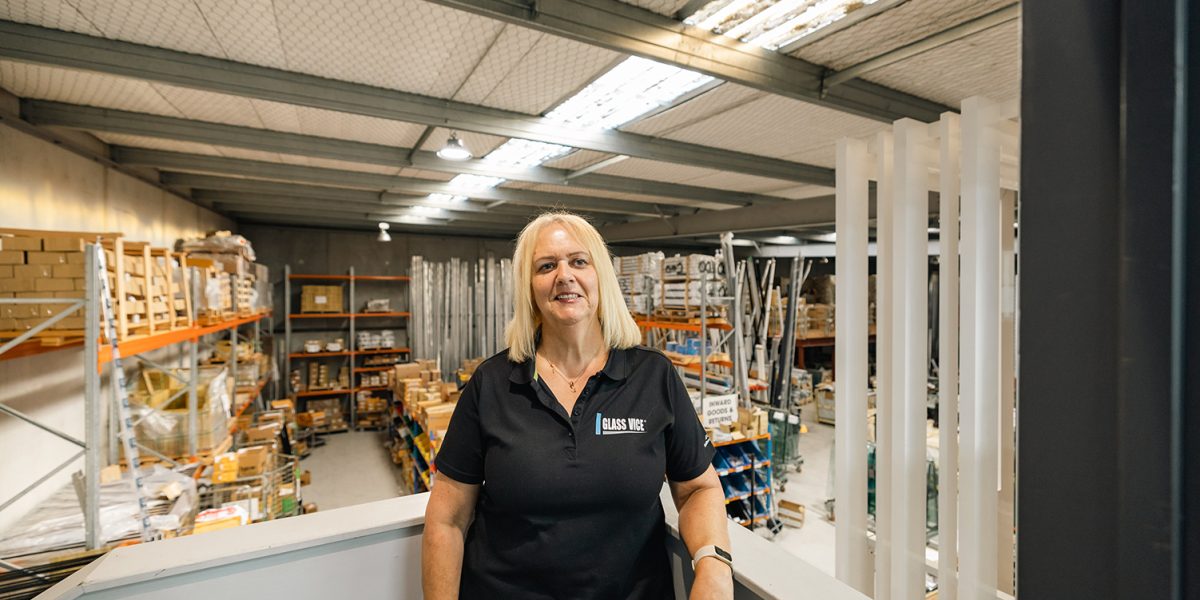From Back Yard Invention to Global Innovation
Glass Vice is a wonderful example of the power of asking why something couldn’t be done differently and then going out and doing it. Not only have they innovated an industry with their glass balustrade fixing system, but they have created a global family business.
Co-Founder Jane Allen gives us her insight on how to take an idea to action, the importance of hard work and the power of good busy.
How did you see the opportunity to innovate the sector and build a business out of it?
It was my husband who came up with the invention of what we call Glass Vice. He was in landscape construction and he was working on a big project and the customer wanted some glass fencing. He had a look at what was on the market and he couldn’t find anything that he liked or was easy to install, so he started playing around with a few prototypes.
Everything that was around had holes in the glass and he wanted to come up with something that was quick and easy, had no holes in the glass and would hold the glass in place. From there, he designed and invented the Glass Vice friction clamp and that way of clamping is now used worldwide.
Sign Up To MYOB’s Free 30 Day Trial
Lots of people think about a different way of doing things, but it’s totally different to actually doing it.
He is an inventor. He’s always played around with things in the construction industry. He will work on something if he thinks there must be a better way to do something easier and quicker, as long as it ticks all the boxes and meets all the building codes. He’s big on safety and testing, there’s a lot that goes into it.
I said at the beginning, ‘Why don’t you stick to what you were doing?’ Every so often he reminds me where we are today. We’ve developed our company to become a leader in the glass industry.
He’s also invented some new products for fixing under decks as well, mechanical fixings in the building industry that take the weight of the glass. And now he’s invented another product, which we’ve just launched which is all about floating tiles. Everything we do complements everything else that we do. We stick to our knitting as far as staying within the range of products from that original balustrade market.
Do you have to reign your husband in a little bit, in terms of focusing on these connected elements?
No, because he won’t even tell you what he’s working on! He’s the R&D person. He goes out on site, he’s hands-on. He comes up with an idea, he looks at it, he gets some prototypes made and we work with engineers and then he will go out and see if it works. Some things work the first time, some things don’t, you’ve got to tweak it.
Some things you’re not going to be able to create a business out of. We have a team of 20 staff, so our installers benefit from everything that we do. It makes it quicker, so the cost comes down for the person at the end who’s paying the bills. He’s totally opposite to me on the facts and figures and numbers. He is the designer and has always been that way.

Do you think that balance is the secret to your success?
Oh, absolutely. We clash over certain things and we also have worked together. There wouldn’t be a business without both of us. He could have a product to sell and all the rest of it, but you have to have the accounting side. All of that’s got to be in place as well to be able to build your company. It’s all very well having a product, but you’ve got to get the product to market. He’s not a paper person, I’m the paper person.
Do you sometimes have to put in rules around having a work-life balance?
Not in our house. It’s a family business, because we now have three sons that work in the business as well. You would say that it all blurs sometimes, and our boys are probably better at work-life balance and taking time out, as opposed to ourselves. We work most days and you take it home with you.
But we enjoy work, so I don’t feel like it gets in the way of anything. By having a successful business, you also get the rewards along the way so you share all those as well.
When you see your sons managing that work-life balance, do you take a little bit away from that and look to balance things out?
No, but we did buy a jet ski. We travel, except Covid restricts that. We like going out to dinner. We do a lot together, my husband and I. We’re never short of conversation, we have common interests. But I could stay at home and be quite happy and content by myself. I can find plenty of things to do. I like cooking, reading and gardening. I love home renovation.
Were there moments along the way where you thought to yourself, how the hell are we going to keep going through this?
Oh, absolutely. When we started, I was actually working for another company and I would finish there and then I would go home. We had a small warehouse and offices and at that stage, I had teenagers with school things going on as well. So I would go back to work and work until midnight and realise, ‘Oh, I better go home now’.
We put the hard work in at the beginning to get to where you are and people don’t always see the work that goes on in the background.
Do you look at the hours that you’ve put into it and wonder if there were elements of productivity and busyness for the sake of being busy?
I probably take on too much and I realise that now. We have good mentors and advisors. In the past, I tried to wear too many hats. Everything from legal to HR to whatever you have to do. You go from two staff to 20 staff and then you realise that you need to outsource some of those things and you need to pay people to do it and you don’t need to be doing all those things yourself.
Covid has made it very hard to find people to employ. That’s the challenge that you’re up against now, but we want to grow to the next level and we have plans in place. You can’t do that without getting the right strategic people now so you are not just a small business, you need to employ key people. And then stop trying to do some of those things yourself, which is what we’re doing.
To go from two staff to 20 staff, to whatever the next level looks like, has that been a learning curve for you?
Oh, it is. We work with PwC. We had a meeting recently and you need to look at where everybody is in the company and then identify how to grow the business with people. You can hire a whole lot of people, but you’re not really going to achieve anything, you’ve just got more people working for you.
You need to strategically work out who and what you need to be able to grow, not just in the sales, but you need to maintain a profit as well. Your sales might go up, but your profit doesn’t. You’ve got to maintain that profit level.

When you look at the sort of people that you need to scale, how important is attitude and personality, as opposed to skillset?
Both are important. You do need people that fit in with the people that you already have. When you’ve got a wide range of ages you’ve got to make sure that people are not going to be offended by other people. It’s a bit of a balancing act, it’s a learning curve and that’s why now we have outside HR help, because when you get a diverse range of people, you are going to have little issues that pop up.
How has your role evolved as the business has scaled?
I do the accounting side and we have an accountant that does the end of year stuff. But day to day, that’s me. We have a few companies that I look after, so I’m balancing all of that. I like the shipping side, we do exports and imports. I’ve had to learn that by myself, nobody taught me how to do that. We have some good companies that we work with; freight companies, freight brokers and you learn by mistake. But now, talking to suppliers overseas, you know what you can ask for.
I work on all the day to day running of the companies. I’m the Operations Manager, so I manage everything that goes on, and then we have an admin team who do invoicing and all that side of things. I don’t really get involved in that. I’m more into finance and making sure everything’s running smoothly. We own commercial buildings and I’m the chairman of the body corporate for four units in our complex. And then we have two other buildings that we are leasing. So yes, there’s a bit involved in all of those as well.
That does seem like a lot of spinning plates. Is there a way that you mentally prepare for each day?
We’re looking at the moment to bring someone in as our in-house accountant. I do the payroll, so they’ll be taking away some of those roles as well. We export to the States and we actually have Glass Vice USA based in San Diego and unfortunately, because of Covid, we haven’t actually been able to get up there for two years.
We were coming back in March 2020 and we got in just before they shut the border. We haven’t been able to go up to our own company for two years. They’ve been ticking away, but you can’t go to the trade shows or anything. So hopefully now we are heading towards this year, things are going to open up and we can get back up there, because that’s an area that has huge potential for our company as well.
Does that mean that you might start to focus more on the US side of things and more overseas?
Yes, definitely. That was a big hurdle to set up in San Diego about four or five years ago and you have to get your product signed off to be used in the building industry for every state because they aren’t like New Zealand. There’s not just one building code, each state has individual building codes. If you want your product to be used across America, then you need to go through a certain testing certification process which took us three to four years to get sign-off to get blanket approval.
We ship our product to New York and Miami. You can’t just go into somewhere like the United States and try and sell your product everywhere because there are different laws that are involved in that. It’s been challenging.
Do you have any advice for being able to stand back and define what is the best use of your time and how to let some things go?
No, that’s the challenge that I have at the moment. I am the person trying to do too much and need to learn to delegate. But that also means you’ve got to get more staff as well and the right staff. Because we use MYOB, you’ve got to get staff that are trained in MYOB as well.
I’m a night person, I do long hours. I’ll go home and I might drag some work out at 10 o’clock and the next thing it’ll be one o’clock in the morning. I like the quiet time at night, I feel like I can focus, I achieve a lot at night. During the day in the office, it’s always busy and you’re always getting interrupted, you’ll be putting out little fires.
Bad busy to me is when you’re putting out fires and good busy is when things go smoothly, stock comes in, there are no issues. At the moment, you’ve got shipping delays, you’ve got local couriers not turning up. There’s a whole lot of challenges, but I thrive on that sort of thing. It’s not necessarily a good thing.
Often the days in the office are just a whole series of bushfires and it’s about finding the quiet time where you can actually be alone with your thoughts and think.
That’s why I start at 9:30, 10 o’clock because I missed the traffic. I used to come in earlier and then you’d spend the same amount of time in your car getting to work and I’d thought, I can work from home. I would rather get here a little bit later. I’ve already read all my emails and done all of that at home, so when I come in, I already know where I’m at and what I need to do.
And then later in the day, everybody’s going home at about 4:30, so after that time, it’s quieter and that’s when you get a lot more of the accounting and things like that done. That’s also when we deal with a whole lot of different countries who are seven hours behind you. I save some of those things until later in the day when I know that their day is starting. We deal with India, Taiwan, China, Thailand and Australia.
What drove the decision to go with MYOB?
It was simple to use and it’s grown as we’ve grown. We’ve got multiple currencies, we’ve got payroll and inventory and it covers everything that I need it to do. It’s in the cloud, so you can work anywhere in the world.
Can you give any examples of how the software has helped you grow and helped you scale the way you have?
It’s easy for invoicing, easy for staff to use, easy to find what you’re looking for. I don’t like to say negative things about other programs, but having a company that was not on MYOB just made things take twice as long. It’s just the ease of finding things and you’d have to use two different softwares to actually realise the difference because there is a difference.
They’re constantly updating and changing and improving it. Everything has little hiccups, but we don’t have any issues with it. We haven’t had any problems.

Have you found that it’s been able to scale with you as you’ve moved from a sole trader type situation to a larger company?
Most of the stuff that we pay is in US dollars, so you can use multiple currencies. When MYOB made the online version that we use, the ability to do that then, that just improved what I did overnight, it just made it so much easier. Before I was doing it manually, so it is evolving with what I need. MYOB as far as I know, can cater to growth.
What was the moment though when you realised that you could do this and build something on this?
When I went to work there full time. You work there full time and then you start employing people and you’re cautious. Then when you start to see your product being used on huge projects overseas, that’s really exciting.
There’s one huge one in San Diego, right on their waterfront that was on Good Morning America, but we haven’t been able to go and see it because of Covid. That will be exciting when we can go up there, which hopefully will be this year.
You talk about building something for your future and for your sons, but that visual, tangible statement on the landscape must be incredible as well. Does it feel like you are leaving a physical legacy?
Well, for my husband, he probably thinks, who would’ve thought? When you’re walking down places overseas and you see the product and you go, ‘Wow, who would’ve thought that we would be over here?’

